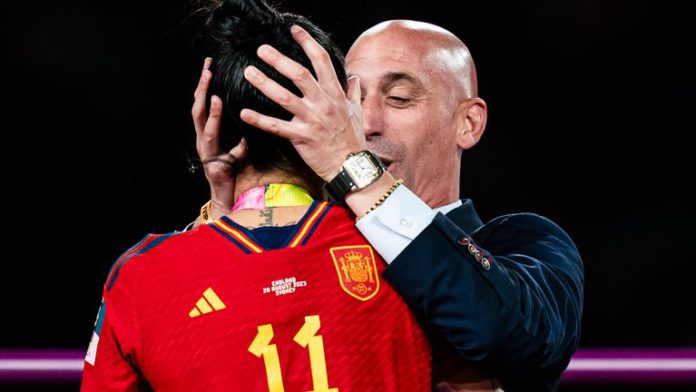
A judge has been asked to ban Spain’s ex-football boss Luis Rubiales from approaching footballer Jenni Hermoso.
Prosecutors asked for a restraining order as the national court in Madrid considered a criminal complaint of sexual assault and coercion.
Appearing in court for the first time, Mr Rubiales denied sexually assaulting Ms Hermoso by kissing her on the lips after Spain’s Women’s World Cup win.
Ms Hermoso has insisted she did not consent to the kiss.
The former president of the football federation (RFEF), who resigned his position earlier this week, appeared in a closed court session to deny two criminal offences.
Judge Francisco de Jorge was asked to bar him from approaching within 500m (1,600ft) of Jenni Hermoso, or from communicating with her. He will later decide whether to send the case to trial.
Spain won the Women’s World Cup in Australia on 20 August, but the team’s success has been overshadowed ever since by Mr Rubiales’s actions during the celebrations after the final whistle.
Mr Rubiales arrived in court in a black suit and white shirt, and spent a reported 45 minutes being questioned by the judge.
After denying the allegations against him, he left the court alongside his lawyer Olga Tubau.
Mr Rubiales has maintained that when he held her head in his hands and kissed her on the lips it was mutual and consensual. He eventually resigned on Sunday as president of the federation, declaring: “I have faith in the truth and I will do everything in my power so that it prevails.”
Ms Hermoso, 33, says that she did not consent to the kiss. Prosecutors submitted her initial complaint of sexual assault and added one of coercion, arguing that he had put pressure on the Spain forward to come to his defence amid uproar in the days after the kiss.
Outside court, her lawyer Carla Vall said that everyone had seen what had happened: “We can say precisely that thanks to [these images], and thanks to social change and changes in the law, we can show that Mr Rubiales had a complete lack of consent.”

Spain’s left-wing government reformed laws on consent in the past two years after a notorious gang-rape case in 2016 that led to five men being cleared of rape.
Under the so-called “Only Yes is Yes” law, a non-consensual kiss can be considered an offence of sexual assault, so Mr Rubiales could face a fine or even a jail sentence if the case goes to trial and he is found guilty.
Five days after the World Cup victory, Jenni Hermoso issued a statement saying that no person in a work, sport or social setting should be a victim of such non-consensual conduct: “I felt vulnerable and a victim of an impulsive-driven, sexist, out-of-place act, without any consent on my part.”
She is due to give evidence to the court at a later date.
The judge will decide whether the case goes to trial after examining a series of videos from before, during and after the ceremony.
He has asked to see the moment of the kiss “from all angles”. He will also examine videos of the celebrations in the dressing room and on the team bus as they left the stadium in Sydney.
Mr Rubiales was initially suspended by world football’s governing body Fifa, before he eventually stood down as both head of the RFEF and vice-president of Uefa.
For weeks he had refused to stand down, while opinion polls suggested more than 70% of Spaniards found his conduct unacceptable.
In one combative address to the RFEF last month he hammered home the words “no voy a dimitir” – I will not resign – five times.
In a TV interview with Piers Morgan, he repeated his contention that the footballer had lifted him up at the time of the kiss, rather than the other way around. “We had the fleeting kiss, two-tenths of a second, but what was created from that is crazy,” he said.
The events in Sydney continue to rock Spanish football. Earlier this month, women’s team coach Jorge Vida was fired and replaced by assistant coach Montse Tomé, the first woman to run the team.
Vilda’s own role in the federation has itself been controversial. Fifteen members of the women’s team, known as La Roja, resigned a year ago complaining the situation in the national team had affected their emotional state and mental health.
Tomé is due to announce her first squad on Friday ahead of two UEFA Women’s Nations League matches against Sweden and Switzerland later this month.
However, 41 Spanish players have told the RFEF they are not available for selection. They have called for structural changes at the heart of the federation and are dissatisfied with the measures it has taken so far.
READ ALSO






